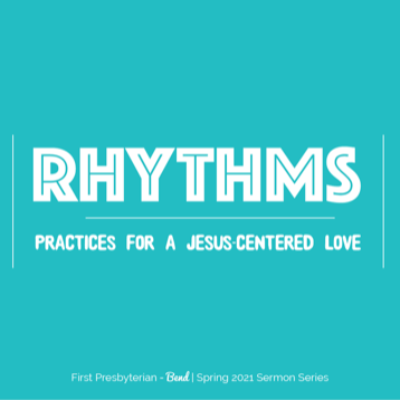Apr 25th, Rhythms of Reverence, Practices for a Jesus-Centered Love
A Part of the Series:
Rev. Dr. Steven Koski
Other Articles in:
Apr 25th, Rhythms of Reverence, Practices for a Jesus-Centered Love
Take a deep breath. Consider for a moment the breath you just took, is your gift, the very air that we breathe is your gift, you know, it’s so easy to take life and the many gifts inherent in life for granted. I sometimes wonder what would happen if we if we stopped asking each other, you know, what did you do today? And instead, we learned to ask. What did you notice today, what surprised you, what amazed you?
What gifts took your breath away? The poet Elizabeth Barrett Browning wrote. Earth, is crammed with heaven. And every common bush a fire with God, but only the ones who see. Take off their shoes. The rest of us sit around and pluck Blackberries. Abraham Heschel said faith begins with reverence awe wonder. Our goal should be to take nothing for granted to live every day and radical amazement. To never treat life casually. To embrace life.
As a gift. This past Thursday was Earth Day, I mean, Earth Day is is every day. You don’t need me to cite statistics of melting ice caps, rising temperatures, raging fires, ravaged rainforests, polluted air, contaminated water, drought stricken land, extreme weather. To know. To know that we are living in the midst of an environmental crisis. And I believe our environmental crisis at its core. Is a spiritual crisis. I mean, we’re not likely to save what we take for granted, we’re not likely to save.
What we don’t savor we’re not likely to save what we we arrogantly assume exists to serve us. We’re not likely to save what we see as separate from us. Rather than deeply and intimately connected to us. We’re not likely to save what we don’t love deeply fundamental to our faith. Is the view that the Earth. It’s not a commodity to be used and abused and and consumed without limits for our pleasure and greed. The Earth is a sacred gift to be revered, cherished.
Protected, shared. The poem said, the earth is crammed with heaven. Psalm twenty four says the earth is the Lord’s and the fullness thereof. And creation is the first Bible. God is revealed in nature. We meet the creator in creation as the poet Wendell Berry calls it God’s holy Earth. It says in Genesis. That God saw all that God had created. And declared it beyond good and then the very first thing God asked us to do.
Was to be the ones to make sure. All of creation stayed so very good. That’s our holy task. Do you remember that old spiritual as I went down to the river to pray, studying about the good old way oh brothers and sisters, let’s go down let’s go down to the river to pray. You know, maybe we need to return to the river, pray. Connect with the river. Remember the river as a gift? As good, make sure the river is clean, pray with the river, pray in the river, pray on the river.
Pray around the river. A pastor friend of mine shared a story of how how she got water from the river next to the church, she was serving for a baptism. And just that week, the local newspaper talked about how how that particular river was contaminated from toxins from a nearby plant. So when she said she was going to use that water, the water from the river for the baptism. And to pour that water on the child’s head. I mean, everybody was was horrified and scared for the child, didn’t think that was a good idea at all.
And concern for the well-being of the child was justified. What’s interesting. Is that not one person in that church expressed any concern at all for the river? And what might be needed for the river? To be healed for the river to be regenerated. The baptism of the child celebrated the gift of life, the gift of God’s love. No one recognized it was from God’s love they were given the gift of that river. And the gift of life.
The river was threatened. So maybe we need to go. Go down to the river to pray. I wonder how my relationship to the river might change if. You know, before I got in my kayak. To enjoy being on the river. I took a moment to pray. I took a moment to give thanks. For the gift of the river. Chief Oren Lyons in his book Spiritual Ecology wrote. Thankfulness. Inspires reverence and respect. If each day we express thankfulness for even one aspect of creation, the rising of the sun, the wind in our hair, the the grace of the birds in the air, the beauty of the flowers, the salmon that swim in the stream. Our respect and reverence for creation. Will grow. And we’ll be reminded how deeply and and intimately connected to creation we are. Chief Oren Lyons said we have divorced creation from the creator. And lost our sense of reverence and gratitude, our souls are the poorer for it.
And the holy Earth is suffering. On the sacrament of Holy Communion, Jesus. Held up bread. Bread, a gift from the Earth and the very first thing he did. He gave thanks. So I wonder what would happen if before I got in my kayak? It became a spiritual practice, to give thanks. For the gift of the river. Even give thanks for the sound of the geese. And then I wonder what might be what might happen.
If I shifted my focus. From seeing the river as existing to serve me. As existing to serve, my pleasure. And instead adopted a posture of humility. And recognize that the river. Has beauty and value that exists separate from me? There’s an indigenous saying that says, may you have such humility of spirit. That your feet kiss the Earth with every step you take. You know, it’s a good exercise to de-center ourselves. To take ourselves out of the spotlight.
And to savor the beauty and the worth of creation. Separate from how it might serve us. Martin Buber said there are two ways of relating, I it or I thou. You know, I it is when we treat others. As if they primarily exist to serve us to serve our purposes. I thou is when we recognize and affirm. The inherent worth and value of the other we see the other as sacred in and of itself. What if we saw a relationship with creation through that lens?
Rather than an it. That simply exists to serve our needs. For our pleasure, our greed. One of the Earth was a sacred thou holy, to be revered. When we decenter ourselves. And think less about how creation might serve us. And simply experience the glory and the beauty of creation itself. We walk more lightly on the Earth. We tend to care more. And what creation needs right now is more people who care more. Jesus was asked one day.
Of all of the six hundred and thirteen laws, which one’s most important? Jesus said love. Love the Lord, your God with all your heart, mind, soul and strength and love your neighbor. As yourself, there’s nothing nothing more important than that. And Jesus showed us with his life. What the rhythms of that love look like. It’s not a love that’s self-serving, it’s a sacrificial love a love that serves with humility.
A love that reveres the least of these. A love that protects. And revers. The most vulnerable. It’s a love that reaches, where others refused to love. It is a love that reveres the worth and value of the other. Theologian Eric Reese said, we fall short of the great commandment to love God, because we do not love all that God has created enough, love of God, love of neighbor, love of self, love of creation.
It’s all connected to love, God is to love your neighbor. How can you love your neighbor? Without caring about the kind of environment. That your neighbor lives in. So, again, I wonder what might what it might be like. To adopt a spiritual practice that then when I finished kayaking or. Fishing or hiking or gardening? When I finish taking in the remarkable beauty of central Oregon. Take a deep breath of gratitude. Recognizing the sheer gift of creation.
What if I take a moment? To think about. How all things are connected. I take a moment to recognize again that to love God is to love your neighbor, to love your neighbor. Is to care about the environment. Your neighbor lives. And care about those who who are most vulnerable. And how their well-being, is connected to your well-being. What if when I finished kayaking, I asked myself, what is one thing I can do today?
To love God. By loving my neighbor, my most vulnerable neighbor. By finding a way to care about the environment my neighbor lives in. A recent study by the Clean Air Task Force. Concluded, black, indigenous and people of color are four times more likely to die from exposure to pollution than white people. African-Americans are exposed to 40 percent more polluted air than white Americans, and there’s seventy five percent more likely to live in communities that border a plant or a factory.
Black, indigenous, and people of color. Are three times more likely to live near toxic waste sites. This past year during the coronavirus pandemic. More than half of all in hospital deaths were Black and Latino patients. According to researchers at both Stanford and Duke. And black patients were far more likely to require ventilation. Why? Well, Robert Bullard, author of Dumping in Dixie. Said, if your zip code is buried with garbage, chemical plants, pollution, toxic waste.
You don’t have to be a rocket scientist to know. There will be more sickness, diabetes, heart disease in those places. And covid is like a heat seeking missile, zeroing in on the most marginalized and vulnerable communities. He calls this. Environmental racism. Love of God. Love of neighbor, love of self, love of creation. It’s all connected. On this Earth Day, the question to ask. Do we love enough? The environmental crisis.
Is a spiritual crisis. We’re not likely to save what we take for granted. We’re not likely to save what we don’t revere and love deeply. We’re not likely to save what we see as separate from us. Rather than intimately connected to us. Some of the most hopeful words in the entire Bible are the very first words in Genesis one. You know, most most of us were taught that it says in the beginning, God created. The original language, the Hebrew actually says.
In the beginning. God began to create. And God continues to create God is not finished yet. God’s not finished with us. God’s not finished with the world. God continues to create, restore, renew. He’ll. And we are called to partner with God. In that holy work. What a privilege. And maybe it begins. By going down to the river to pray. To remember the story about the good old way. To remember that we are so deeply loved.
That we might love. And Revere. And he’ll. All that God loves. May it be so.



